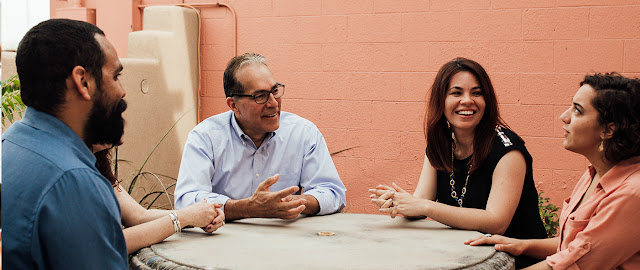As we celebrate what would have been the 89th birthday of the Rev. Dr. Martin Luther King, Jr., we have an excellent opportunity to connect with others who are committed to advancing racial equity and justice.
On Jan. 16, communities across the country will celebrate the National Day of Racial Healing (#NDORH) with events and activities as distinct as their participants. Marking the second annual National Day of Racial Healing, established by the W.K. Kellogg Foundation (WKKF) in 2017, the movement is designed to promote healing as a critical path for ending racial bias and creating a society in which all children can thrive.
 |
| La June Montgomery Tabron |
High school and college students, civic leaders, teachers, librarians, recording artists, and more will come together in auditoriums, museums, libraries and churches, or on social networks.
"The day creates space for people of all backgrounds to come together and begin taking steps in unity toward stronger and more equitable communities,"
The National Day of Racial Healing is part of WKKF's Truth, Racial Healing & Transformation (TRHT) effort, a national and community-based process designed to bring transformational and sustainable change to communities, while addressing the historic and contemporary effects of racism.
"It's exciting to see how this idea is inspiring people to create events and activities around what's real and needed in their communities," Tabron says. "Gathering experiences like these get to the emotional core of changing hearts and minds. They are important groundwork for envisioning and constructing the equitable systems all children need."
Tuesday's National Day of Racial Healing outreach will touch every region of the country, including:
In the Kellogg Foundation's hometown of Battle Creek, Michigan, more than 1,200 local high school students will participate in an interactive art and musical performance by national and local artists including J. PERIOD, Isabel Delgado, Kinetic Affect and others, to help promote unity, elevate youth voices and motivate students toward positive action.
"Young people are the lifeblood of nearly every significant social movement that has transformed our country," said Tabron.
"They are not immune to the effects of a racialized society, and it is vital that they too have the space to tell their truth, and in doing so, find commonality with their peers. This experience will equip and empower students to continue the healing process to transform our schools, neighborhoods and community. And, our hope is that they will continue to engage in their local TRHT effort in Battle Creek."
In New Orleans, Ashé Cultural Arts Center, the Foundation for Louisiana (FFL), TRHT Louisiana and the City of New Orleans will host a live performance by local artists and award-winning, jazz and gospel vocalist Lizz Wright as part of her Truth, Racial Healing & Transformation tour at 7.p.m. CST. This will be held at the Mahalia Jackson Theater, and tickets are complimentary. Doors open at 6 p.m. CST.
A National Livestream Broadcast called "Healing Hearts with Grace" on the National Day of Racial Healing Facebook page will feature events from around the country from 6:30 to 7:30 p.m. CST and then air the Lizz Wright concert afterward.
In Selma, Alabama, the Black Belt Community Foundation (BBCF) is promoting National Day of Racial Healing with a television ad campaign airing on WSFA-TV (NBC affiliate) in Montgomery. Moreover, the foundation, in partnership with the Selma Center for Nonviolence, Truth and Reconciliation, is holding a series of service events and healing circles spanning the weekend of Martin Luther King Jr.'s Birthday and National Day of Racial Healing, with a grand finale musical concert at the Selma Center. The concert will feature nationally-acclaimed musical artist Kishi Bashi with the No-No Boy project.
Meanwhile, the Association of American Colleges & Universities (AAC&U) is calling on schools across the country to host activities that promote healing and foster engagement around the issues of racism, bias, inequity and injustice.
For example, Millsaps College in Jackson, Mississippi, will hold a series of campus events featuring faculty and staff speakers, small group discussions, and interactive activities. In addition, a community art project will ask members of the campus community to answer, "Where do you see that racial healing is needed most in the world today?" on a large Millsaps College flag.
And, Rutgers University—Newark has launched a social media campaign, "My Racial Healing Looks Like…" in which students can share how they will take a stand for racial healing, and a poster board activity will turn racial slurs and micro-aggressions into words of love, positivity and empowerment. An evening event will invite participants to use spoken word, poetry and music to express what racial healing looks like to them.
In Buffalo, New York, the Native American Community Services of Erie and Niagara counties will screen and discuss four Native films throughout the day from 9 a.m. to 4 p.m. and the Greater Buffalo Racial Equity Roundtable will host an inter-faith community service.
More than 150 people will attend the Greater Chicago TRHT's sold-out "What is OUR Story" event at the Illinois Holocaust Museum & Education Center. Guest speakers include Cook County State Attorney General Kim Foxx, Chicago social justice activist Rami Nashashibi, Chicago City Colleges Chancellor Juan Salgado, local artist and poet Harold Green; and Amanda E. Lewis, professor of African American studies & sociology, and director of the Institute for Research on Race and Public Policy at the University of Illinois.
The American Library Association has also released a compilation of reading lists to its members and for parents and educators to use in honor of the day.
"These communities and organizations are demonstrating why the National Day of Racial Healing is so important," said Tabron.
"We can't accept the divisions we see as permanent or the way things have to be. By working together, all of us can lead a transformation. And the expanding participation in the National Day of Racial Healing demonstrates that the transformation is well underway."
Learn more about the National Day of Racial Healing and other related events around the country.

